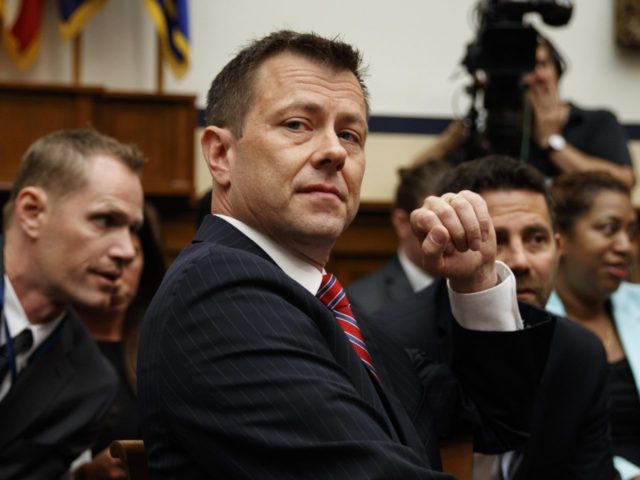The most memorable thing about FBI agent Peter Strzok’s testimony in the U.S. House on Thursday was not what he said. It was the way he smirked throughout the day-long hearing into whether his private bias against Donald Trump affected his handling of the investigations into Hillary Clinton’s emails and Russian interference in the 2016 election.
The way for Strzok to win the day would have been to affect an air of contrition, to say the words “I’m sorry,” and to show a degree of humility as a public servant.
Instead, he was smug throughout. He seemed proud of his attacks on Trump in text messages to his mistress, former FBI lawyer Lisa Page, describing them as a reasonable response to the Khizr Khan controversy in August 2016 and then-candidate Trump’s supposedly “disgusting” rhetoric. He even expressed contempt for the hearing: “I truly believe that today’s hearing is just another victory notch in [Vladimir] Putin’s belt,” he said, casting congressional oversight as the machination of an enemy power.
Most striking of all, Strzok seemed almost incapable of acknowledging that he had any kind of political bias, even outside of his professional work for the FBI. In his own mind, his strident anti-Trump views were simply a reflection of reality.
But Strzok had to twist reality to suit his self-serving illusions. He repeatedly insisted, for example, that the Department of Justice’s Inspector General (IG) had cleared him of political bias.
In fact, as Rep. Ron DeSantis (R-FL) pointed out, the IG report noted explicit concerns about Strzok’s possible bias: “[W]e did not have confidence that Strzok’s decision to prioritize the Russia investigation over following up on the Midyear-related investigative lead discovered on the Weiner laptop was free from bias.”
Furthermore, the IG is still investigating the FBI’s handling of the Russia investigation, and could very well conclude that Strzok’s political bias played a role. Certainly Strzok himself believed that the Russia investigation would have a desirable political effect.
Strzok is like the Patient Zero of Trump Derangement Syndrome — the first who bought fully into the Russia conspiracy theory, and into the idea that a democratic election represented a threat to national security that justified almost any measures taken in response. He is so deeply consumed by his bias that he cannot even see that he has one. He has been made to wear a scarlet letter, but does so with pride, seeing the misfortune of his public humiliation as an opportunity to take a political stand against Trump.
Strzok’s testimony suggested the chilling possibility that senior levels of the civil service have become a liberal political monoculture, such that the state can no longer distinguish between the interests of the Democratic Party and those of the nation as a whole.
That possibility first arose during the IRS scandal in 2013, when Lois Lerner and other officials targeted conservative groups at the behest of Democratic Party leaders. Then, as now, congressional Democrats ran interference, doing their best to cast the miscreant federal officials as selfless patriots.
But at least Lerner had the self-awareness to know her conduct would be perceived as partisan. She refused to answer questions from Congress. Strzok seemed delighted to do so, to attack Trump in public rather than in private.
And Democrats applauded him, with Rep. Steve Cohen (D-TN) suggesting that Strzok deserved a “Purple Heart” — the medal given to soldiers wounded on the battlefield. Neither Strzok nor the other Democrats on the panel shrank from that analogy. (Update: Cohen retracted his statement on Friday.) To them, Strzok’s struggles are a sacrifice for the cause.
If he had been caught texting racist messages, he would be seen as a symbol of a corrupt criminal justice system. Because his prejudices were political, he is being fêted by the left as a patriot and a hero.
This was the last thing the FBI needed. Strzok confirmed his critics’ suspicions that he was an anti-Trump zealot who had no business running politically sensitive investigations in a presidential election. People on both sides of the partisan divide gave former FBI director James Comey the benefit of the doubt in 2015 when he claimed: “If you know my folks, you know they don’t give a rip about politics.”
Thanks to Strzok, we know that is not true — which raises questions about FBI management.
Throughout his testimony, Strzok attempted to do what Comey had done before him — namely, to stand up for the integrity of the FBI as a whole, especially the rank-and-file men and women doing their best to protect the country, often anonymously and at great risk to their lives.
But his efforts rang hollow, just like Comey’s, and for the same reason: neither one could resist the urge to exploit their chance to attack the president. In their own minds, each sees himself as a hero, using his power to save America from President Trump.
Strzok’s unapologetic attitude did more to undermine the credibility of the FBI, and the Russia “collusion” investigation, than any amount of grandstanding from the Republican politicians on the panel.
He gave a face, and a smirk, to the so-called “Deep State.”
Joel B. Pollak is Senior Editor-at-Large at Breitbart News. He is a winner of the 2018 Robert Novak Journalism Alumni Fellowship. He is also the co-author of How Trump Won: The Inside Story of a Revolution, which is available from Regnery. Follow him on Twitter at @joelpollak.

COMMENTS
Please let us know if you're having issues with commenting.